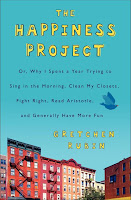Rating: 7.5/10
Gretchen Rubin had an epiphany one rainy afternoon in the unlikeliest of places: a city bus. "The days are long, but the years are short," she realized. "Time is passing, and I'm not focusing enough on the things that really matter." In that moment, she decided to dedicate a year to her happiness project. In this lively and compelling account of that year, Rubin chronicles her adventures during the twelve months she spent test-driving the wisdom of the ages, current scientific research, and lessons from popular culture about how to be happier. Each month she tackled a new set of resolutions: give proofs of love, ask for help, find more fun, keep a gratitude notebook, forget about results.
She immersed herself in principles set forth by all manner of experts, from Epicurus to Thoreau to Oprah to Martin Seligman to the Dalai Lama to see what worked for her—and what didn't. Her conclusions are sometimes surprising - she finds that money can buy happiness, when spent wisely; that novelty and challenge are powerful sources of happiness; that "treating" yourself can make you feel worse; that venting bad feelings doesn't relieve them; that the very smallest of changes can make the biggest difference - and they range from the practical to the profound.
I’m finding it hard to review this book because I really enjoyed it but I’m not quite sure what to write about it. Gretchen Rubin’s writing is conversational and funny, despite the fact that this somewhat biography could also be put into the self-help section in a bookstore. It’s realistic about the average person’s life and their level of ability to include her ideas and suggestions into their busy schedules.
The time to start exercising, stop nagging, and organise our digital photos was when everything was going smoothly. I didn’t want to wait for a crisis to remake my life.
One aspect I loved about this book is that Gretchen has obviously done a significant amount of research into the psychology and history of happiness, which I found interesting. She doesn’t rely on it in her own story of happiness, but manages to incorporate the research into what she did and why. Gretchen is also well-read on subjects such as religion, parenthood, general health and work.
"Nothing,' wrote Tolstoy, 'can make our life, or the lives of other people, more beautiful than perpetual kindness."
I enjoyed this book because it gave me some small manageable ideas on how to make life happier, which is important in a year that has been quite full of stress and anxiety. I feel that this is what Gretchen Rubin was aiming to do, giving people manageable ideas on how to make their lives happier without having to jet off to Italy for a year or do something drastic like quit their job. And for this, she succeeds.










